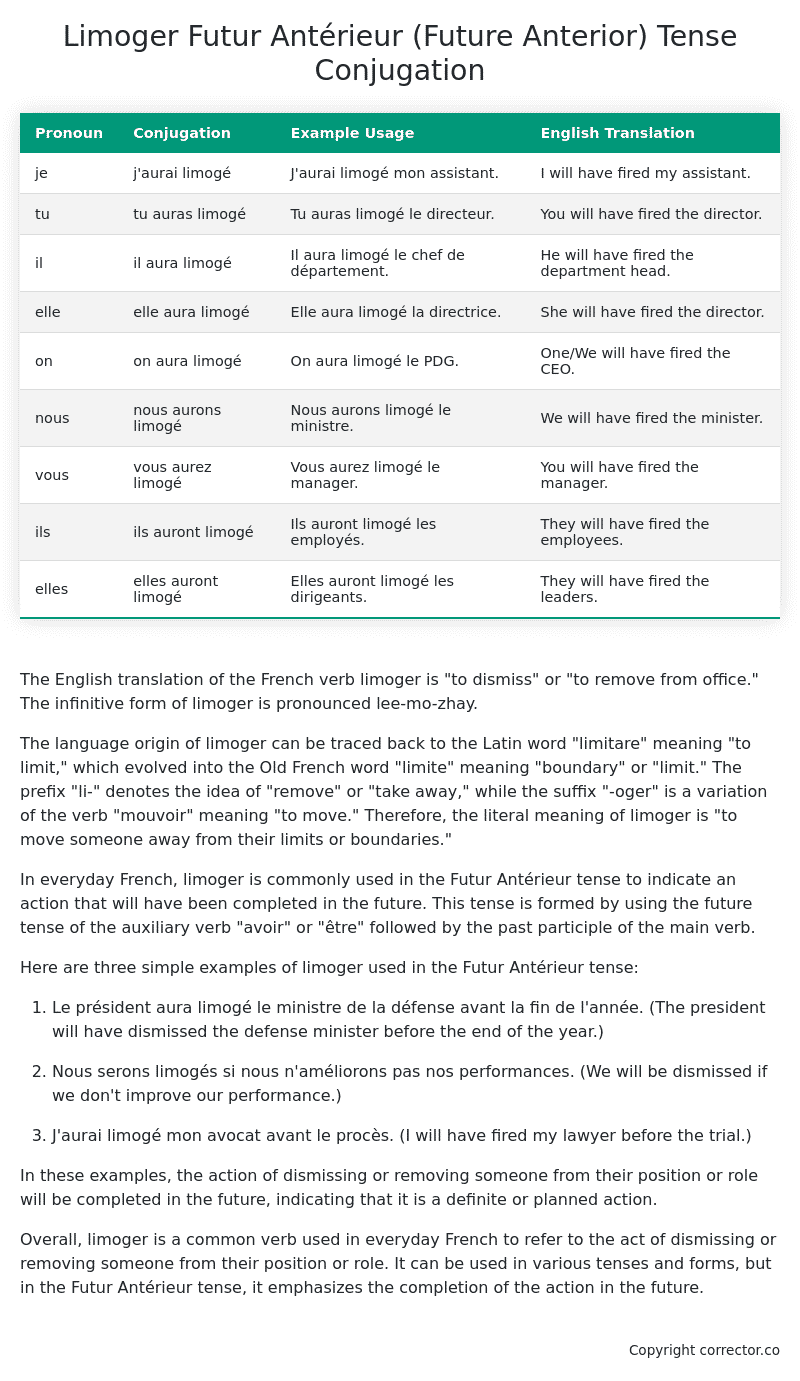Futur Antérieur (Future Anterior) Tense Conjugation of the French Verb limoger
Introduction to the verb limoger
The English translation of the French verb limoger is “to dismiss” or “to remove from office.” The infinitive form of limoger is pronounced lee-mo-zhay.
The language origin of limoger can be traced back to the Latin word “limitare” meaning “to limit,” which evolved into the Old French word “limite” meaning “boundary” or “limit.” The prefix “li-” denotes the idea of “remove” or “take away,” while the suffix “-oger” is a variation of the verb “mouvoir” meaning “to move.” Therefore, the literal meaning of limoger is “to move someone away from their limits or boundaries.”
In everyday French, limoger is commonly used in the Futur Antérieur tense to indicate an action that will have been completed in the future. This tense is formed by using the future tense of the auxiliary verb “avoir” or “être” followed by the past participle of the main verb.
Here are three simple examples of limoger used in the Futur Antérieur tense:
-
Le président aura limogé le ministre de la défense avant la fin de l’année. (The president will have dismissed the defense minister before the end of the year.)
-
Nous serons limogés si nous n’améliorons pas nos performances. (We will be dismissed if we don’t improve our performance.)
-
J’aurai limogé mon avocat avant le procès. (I will have fired my lawyer before the trial.)
In these examples, the action of dismissing or removing someone from their position or role will be completed in the future, indicating that it is a definite or planned action.
Overall, limoger is a common verb used in everyday French to refer to the act of dismissing or removing someone from their position or role. It can be used in various tenses and forms, but in the Futur Antérieur tense, it emphasizes the completion of the action in the future.
Table of the Futur Antérieur (Future Anterior) Tense Conjugation of limoger
| Pronoun | Conjugation | Example Usage | English Translation |
|---|---|---|---|
| je | j’aurai limogé | J’aurai limogé mon assistant. | I will have fired my assistant. |
| tu | tu auras limogé | Tu auras limogé le directeur. | You will have fired the director. |
| il | il aura limogé | Il aura limogé le chef de département. | He will have fired the department head. |
| elle | elle aura limogé | Elle aura limogé la directrice. | She will have fired the director. |
| on | on aura limogé | On aura limogé le PDG. | One/We will have fired the CEO. |
| nous | nous aurons limogé | Nous aurons limogé le ministre. | We will have fired the minister. |
| vous | vous aurez limogé | Vous aurez limogé le manager. | You will have fired the manager. |
| ils | ils auront limogé | Ils auront limogé les employés. | They will have fired the employees. |
| elles | elles auront limogé | Elles auront limogé les dirigeants. | They will have fired the leaders. |
Other Conjugations for Limoger.
Le Present (Present Tense) Conjugation of the French Verb limoger
Imparfait (Imperfect) Tense Conjugation of the French Verb limoger
Passé Simple (Simple Past) Tense Conjugation of the French Verb limoger
Passé Composé (Present Perfect) Tense Conjugation of the French Verb limoger
Futur Simple (Simple Future) Tense Conjugation of the French Verb limoger
Futur Proche (Near Future) Tense Conjugation of the French Verb limoger
Plus-que-parfait (Pluperfect) Tense Conjugation of the French Verb limoger
Passé Antérieur (Past Anterior) Tense Conjugation of the French Verb limoger
Futur Antérieur (Future Anterior) Tense Conjugation of the French Verb limoger (this article)
Subjonctif Présent (Subjunctive Present) Tense Conjugation of the French Verb limoger
Subjonctif Passé (Subjunctive Past) Tense Conjugation of the French Verb limoger
Subjonctif Imparfait (Subjunctive Imperfect) Tense Conjugation of the French Verb limoger
Subjonctif Plus-que-parfait (Subjunctive Pluperfect) Tense Conjugation of the French Verb limoger
Conditionnel Présent (Conditional Present) Tense Conjugation of the French Verb limoger
Conditionnel Passé (Conditional Past) Tense Conjugation of the French Verb limoger
L’impératif Présent (Imperative Present) Tense Conjugation of the French Verb limoger
L’infinitif Présent (Infinitive Present) Tense Conjugation of the French Verb limoger
Struggling with French verbs or the language in general? Why not use our free French Grammar Checker – no registration required!
Get a FREE Download Study Sheet of this Conjugation 🔥
Simply right click the image below, click “save image” and get your free reference for the limoger Futur Antérieur tense conjugation!

Limoger – About the French Futur Antérieur (Future Anterior) Tense
Construction
Common Everyday Usage Patterns
Interactions with Other Tenses
For example
Summary
I hope you enjoyed this article on the verb limoger. Still in a learning mood? Check out another TOTALLY random French verb conjugation!


